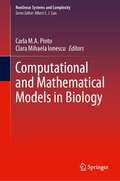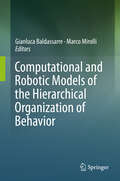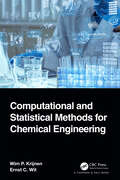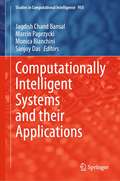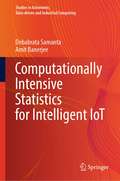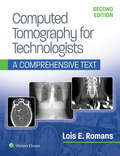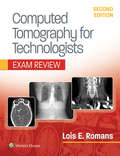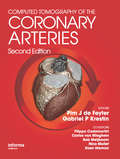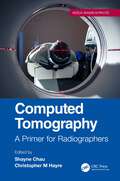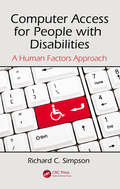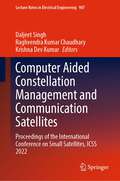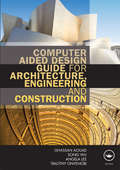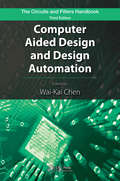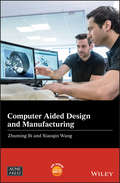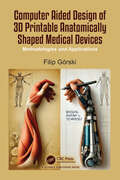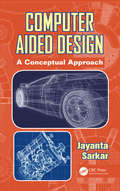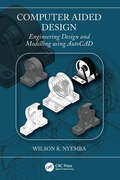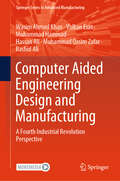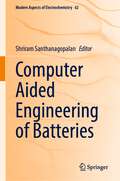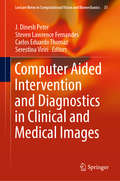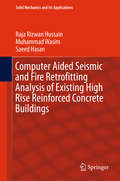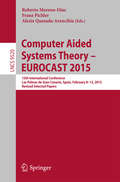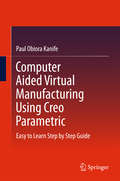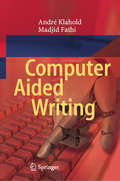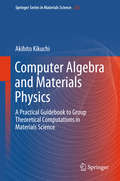- Table View
- List View
Computational and Mathematical Models in Biology (Nonlinear Systems and Complexity #38)
by Clara Mihaela Ionescu Carla M. A. PintoThis book provides the most valuable and updated research on computational and mathematical models in biological systems from influential researchers around the world and contributes to the development of future research guidelines in this topic. Topics include (but are not limited to): modeling infectious and dynamic diseases; regulation of cell function; biological pattern formation; biological networks; tumor growth and angiogenesis; complex biological systems; Monte Carlo methods; Control theory, optimization and their applications
Computational and Robotic Models of the Hierarchical Organization of Behavior
by Marco Mirolli Gianluca BaldassarreCurrent robots and other artificial systems are typically able to accomplish only one single task. Overcoming this limitation requires the development of control architectures and learning algorithms that can support the acquisition and deployment of several different skills, which in turn seems to require a modular and hierarchical organization. In this way, different modules can acquire different skills without catastrophic interference, and higher-level components of the system can solve complex tasks by exploiting the skills encapsulated in the lower-level modules. While machine learning and robotics recognize the fundamental importance of the hierarchical organization of behavior for building robots that scale up to solve complex tasks, research in psychology and neuroscience shows increasing evidence that modularity and hierarchy are pivotal organization principles of behavior and of the brain. They might even lead to the cumulative acquisition of an ever-increasing number of skills, which seems to be a characteristic of mammals, and humans in particular. This book is a comprehensive overview of the state of the art on the modeling of the hierarchical organization of behavior in animals, and on its exploitation in robot controllers. The book perspective is highly interdisciplinary, featuring models belonging to all relevant areas, including machine learning, robotics, neural networks, and computational modeling in psychology and neuroscience. The book chapters review the authors' most recent contributions to the investigation of hierarchical behavior, and highlight the open questions and most promising research directions. As the contributing authors are among the pioneers carrying out fundamental work on this topic, the book covers the most important and topical issues in the field from a computationally informed, theoretically oriented perspective. The book will be of benefit to academic and industrial researchers and graduate students in related disciplines.
Computational and Statistical Methods for Chemical Engineering
by Wim P. Krijnen Ernst C. WitIn the recent decades, the emerging new molecular measurement techniques and their subsequent availability in chemical database has allowed easier retrieval of the associated data by the chemical analyst. Before the data revolution, most books focused either on mathematical modeling of chemical processes or exploratory chemometrics. Computational and Statistical Methods for Chemical Engineering aims to combine these two approaches and provide aspiring chemical engineers a single, comprehensive account of computational and statistical methods. The book consists of four parts: Part I discusses the necessary calculus, linear algebra, and probability background that the student may or may not have encountered before. Part II provides an overview on standard computational methods and approximation techniques useful for chemical engineering systems. Part III covers the most important statistical models, starting from simple measurement models, via linear models all the way to multivariate, non-linear stochiometric models. Part IV focuses on the importance of designed experiments and robust analyses. Each chapter is accompanied by an extensive selection of theoretical and practical exercises. The book can be used in combination with any modern computational environment, such as R, Python and MATLAB. Given its easy and free availability, the book includes a bonus chapter giving a simple introduction to R programming. This book is particularly suited for undergraduate students in Chemical Engineering who require a semester course in computational and statistical methods. The background chapters on calculus, linear algebra and probability make the book entirely self-contained. The book takes its examples from the field of chemistry and chemical engineering. In this way, it motivates the student to engage actively with the material and to master the techniques that have become crucial for the modern chemical engineer.
Computationally Intelligent Systems and their Applications (Studies in Computational Intelligence #950)
by Jagdish Chand Bansal Marcin Paprzycki Monica Bianchini Sanjoy DasThis book covers all core technologies like neural networks, fuzzy systems, and evolutionary computation and their applications in the systems. Computationally intelligent system is a new concept for advanced information processing. The objective of this system is to realize a new approach for analyzing and creating flexible information processing of sensing, learning, recognizing, and action taking. Computational intelligent is a part of artificial intelligence (AI) which includes the study of versatile components to empower or encourage savvy practices in intricate and evolving situations. The computationally intelligent system highly relies on numerical information supplied by manufacturers unlike AI.
Computationally Intensive Statistics for Intelligent IoT (Studies in Autonomic, Data-driven and Industrial Computing)
by Amit Banerjee Debabrata SamantaThe book covers computational statistics, its methodologies and applications for IoT device. It includes the details in the areas of computational arithmetic and its influence on computational statistics, numerical algorithms in statistical application software, basics of computer systems, statistical techniques, linear algebra and its role in optimization techniques, evolution of optimization techniques, optimal utilization of computer resources, and statistical graphics role in data analysis. It also explores computational inferencing and computer model's role in design of experiments, Bayesian analysis, survival analysis and data mining in computational statistics.
Computed Tomography for Technologists: A Comprehensive Text
by Lois RomansPublisher's Note: Products purchased from 3rd Party sellers are not guaranteed by the Publisher for quality, authenticity, or access to any online entitlements included with the product. Covering only what CT technologists need to know, this all-in-one solution helps students develop the knowledge and decision-making skills they need for clinical practice while preparing them for the ARRT registry exam. Organized around the three major ARRT content categories (physics and instrumentation, patient care, and imaging procedures), the fully updated 2nd Edition takes an easy-to-understand approach that combines real-world scenarios, and proven pedagogy to help students master the content of the course.
Computed Tomography for Technologists: A Comprehensive Text
by Lois RomansPublisher's Note: Products purchased from 3rd Party sellers are not guaranteed by the Publisher for quality, authenticity, or access to any online entitlements included with the product. Computed Tomography for Technologists: Exam Review, Second Edition, is intended to be used as a companion to Computed Tomography for Technologists: A Comprehensive Text, Second Edition, and as a review of computed tomography on its own. This is an excellent resource for students preparing to take the advanced level certification exam offered by The American Registry of Radiologic Technologists (ARRT).
Computed Tomography of the Coronary Arteries
by Pim J. De Feyter G. P. Gabriel KrestinUpdated to reflect the notable advances in cardiac computed tomography (CT) imaging, the Second Edition of the best-selling Computed Tomography of the Coronary Arteries provides cardiologists and radiologists with a practical text that explains the basic principles and applications of CT. Written by renowned international experts in the field, this
Computed Tomography: A Primer for Radiographers (Medical Imaging in Practice)
by Chau ShayneThis book acts as a primer for radiographers upon performing computed tomography (CT) examinations. The focus resides in radiation physics, radiobiology, anatomy, imaging protocols and image evaluation. It seeks to provide readers insight into the practical and innovative approaches within CT, backed up with key literature and examples in practice. Recent innovations and the importance of new technology to acquire enhanced quality remain a focal point. These are essential in understanding the importance of dose optimization, patient anatomy and common pathology observed. Patient care will remain central in this book, supported with a dedicated chapter discussing effective communication, patient education, informed consent, coupled with the assessment of laboratory results and vital signs. The editors draw from recent publications and clinical expertise, supported with the growing trend of technological advances utilized within the CT environment. Critically, this volume focuses on the role of CT for an array of audiences but, more specifically, undergraduate and postgraduate radiographers worldwide.
Computer Access for People with Disabilities: A Human Factors Approach (Rehabilitation Science in Practice Series)
by Richard C. SimpsonIncorporating Compass Computer Access Assessment software, Computer Access for People with Disabilities: A Human Factors Approach provides the information clinicians need to know in order to provide effective alternative computer access solutions to individuals with disabilities. This book presents technology for individuals with physical, cognitive, and sensory impairments, and for older adults. The text covers text entry devices, pointing devices, switch access, automatic speech recognition, and web accessibility. The book draws on research from the fields of rehabilitation engineering, occupational therapy, and human-computer interaction (HCI) and emphasizes fundamental concepts and principles that remain true regardless of which specific operating system or product is being used.
Computer Aided Constellation Management and Communication Satellites: Proceedings of the International Conference on Small Satellites, ICSS 2022 (Lecture Notes in Electrical Engineering #987)
by Krishna Dev Kumar Daljeet Singh Raghavendra Kumar ChaudharyThis book comprises the select proceedings of the International Conference on Small Satellites and its Applications (ICSS) 2022. It aims to provide a comprehensive and broad-spectrum picture of the state-of-the-art research, development, and commercial perspective of various discoveries conducted in the real-world smart small satellites, applications, and their services. The contents of this book focus on efficient power management systems, application-based optimum payload designs, telemetry and telecom and advanced navigation and RF systems, flight and ground software, structure, mechanism and materials, spacecraft autonomy, quality, testing and reliability for designing the small satellites through advanced computational procedures for a variety of applications, etc. This book proves to be a valuable resource for those in academia and industry.dgdg
Computer Aided Design Guide for Architecture, Engineering and Construction
by Ghassan Aouad Song Wu Angela Lee Timothy OnyenobiRecent years have seen major changes in the approach to Computer Aided Design (CAD) in the architectural, engineering and construction (AEC) sector. CAD is increasingly becoming a standard design tool, facilitating lower development costs and a reduced design cycle. Not only does it allow a designer to model designs in two and three dimensions but also to model other dimensions, such as time and cost into designs. Computer Aided Design Guide for Architecture, Engineering and Construction provides an in-depth explanation of all the common CAD terms and tools used in the AEC sector. It describes each approach to CAD with detailed analysis and practical examples. Analysis is provided of the strength and weaknesses of each application for all members of the project team, followed by review questions and further tasks. Coverage includes: 2D CAD 3D CAD 4D CAD nD modelling Building Information Modelling parametric design, virtual reality and other areas of future expansion. With practical examples and step-by step guides, this book is essential reading for students of design and construction, from undergraduate level onwards.
Computer Aided Design and Design Automation (The Circuits and Filters Handbook, 3rd Edition)
by Wai-Kai ChenThis volume of The Circuits and Filters Handbook, Third Edition focuses on computer aided design and design automation. In the first part of the book, international contributors address topics such as the modeling of circuit performances, symbolic analysis methods, numerical analysis methods, design by optimization, statistical design optimization, and physical design automation. In the second half of the text, they turn their attention to RF CAD, high performance simulation, formal verification, RTK behavioral synthesis, system-level design, an Internet-based micro-electronic design automation framework, performance modeling, and embedded computing systems design.
Computer Aided Design and Manufacturing (Wiley-ASME Press Series)
by Zhuming Bi Xiaoqin WangBroad coverage of digital product creation, from design to manufacture and process optimization This book addresses the need to provide up-to-date coverage of current CAD/CAM usage and implementation. It covers, in one source, the entire design-to-manufacture process, reflecting the industry trend to further integrate CAD and CAM into a single, unified process. It also updates the computer aided design theory and methods in modern manufacturing systems and examines the most advanced computer-aided tools used in digital manufacturing. Computer Aided Design and Manufacturing consists of three parts. The first part on Computer Aided Design (CAD) offers the chapters on Geometric Modelling; Knowledge Based Engineering; Platforming Technology; Reverse Engineering; and Motion Simulation. The second part on Computer Aided Manufacturing (CAM) covers Group Technology and Cellular Manufacturing; Computer Aided Fixture Design; Computer Aided Manufacturing; Simulation of Manufacturing Processes; and Computer Aided Design of Tools, Dies and Molds (TDM). The final part includes the chapters on Digital Manufacturing; Additive Manufacturing; and Design for Sustainability. The book is also featured for being uniquely structured to classify and align engineering disciplines and computer aided technologies from the perspective of the design needs in whole product life cycles, utilizing a comprehensive Solidworks package (add-ins, toolbox, and library) to showcase the most critical functionalities of modern computer aided tools, and presenting real-world design projects and case studies so that readers can gain CAD and CAM problem-solving skills upon the CAD/CAM theory. Computer Aided Design and Manufacturing is an ideal textbook for undergraduate and graduate students in mechanical engineering, manufacturing engineering, and industrial engineering. It can also be used as a technical reference for researchers and engineers in mechanical and manufacturing engineering or computer-aided technologies.
Computer Aided Design of 3D Printable Anatomically Shaped Medical Devices: Methodologies and Applications
by Filip Gorski"Computer Aided Design of 3D Printable Anatomically Shaped Medical Devices: Methodologies and Applications" presents a comprehensive framework for designing 3D printable medical devices tailored to individual anatomies. Bridging engineering and medicine, the book guides readers through advanced CAD techniques, anatomical data acquisition (via 3D scanning and imaging), and additive manufacturing processes, presenting mostly results of author's own and co-authored research. Emphasizing efficiency, customization, and real-world applications, it showcases methodologies developed in collaboration with medical professionals for orthopedic devices, surgical aids, and prosthetics. Case studies offer insights into practical uses, demonstrating how these innovations enhance patient care and surgical outcomes through personalized, accessible solutions.
Computer Aided Design: A Conceptual Approach
by Jayanta SarkarOptimize Designs in Less TimeAn essential element of equipment and system design, computer aided design (CAD) is commonly used to simulate potential engineering problems in order to help gauge the magnitude of their effects. Useful for producing 3D models or drawings with the selection of predefined objects, Computer Aided Design: A Conceptual Appr
Computer Aided Design: Engineering Design and Modeling using AutoCAD
by Wilson R NyembaThe book comprehensively discusses principles, techniques, research activities, applications and case studies of computer-aided design in a single volume. The textbook will serve as ideal study material for undergraduate, and graduate students in a multitude of engineering disciplines. The book • Discusses techniques for wireframe, surface and solid modelling including practical cases and limitations. • Each chapter contains solved examples and unsolved exercises. • Includes research case studies and practical examples in enabling the user to link academic theory to engineering practice. • Highlights the ability to convert graphic to non-graphic information such as in drawing up bills of materials in practice. • Discusses important topics including constructive solid geometry, Boolean operations on solid primitives and Boolean algebra. This text covers different aspects of computer-aided design, from the basic two-dimensional constructions through modifications, use of layers and dimensioning to advanced aspects such as three-dimensional modelling and customization of the package to suit different applications and disciplines. It further discusses important concepts including orthographic projections, isometric projections, 3D wireframe modelling, 3D surface modelling, solids of extrusion and solids of revolution. It will serve as ideal study material for undergraduate, and graduate students in the fields of mechanical engineering, industrial engineering, electrical and electronic engineering, civil and construction engineering, aerospace engineering and manufacturing engineering.
Computer Aided Engineering Design and Manufacturing: A Fourth Industrial Revolution Perspective (Springer Series in Advanced Manufacturing)
by Wasim Ahmed Khan Rashid Ali Volkan Esat Muhammad Hammad Hassan Ali Muhammad Qasim ZafarThis text introduces the modern concepts relevant to system engineering design and manufacturing from a 4th Industrial Revolution perspective. The book surveys the current status and cutting edge in Computer Aided Design and Computer Aided Manufacturing (CAD/CAM). This bridges the gaps between academic research and industry. It consists of seven parts and seventeen chapters that first structure the subject areas and later detail the main topics under consideration. Each part of the book and each chapter contains a prelude guiding the reader in a systematic way to the next part or topic. The book explains concepts using state-of-the-art teaching methods, using objectives, learning outcomes and review questions. MS PowerPoint Slides and Solution Manual for instructors are available online as well as videos.
Computer Aided Engineering of Batteries (Modern Aspects of Electrochemistry #62)
by Shriram SanthanagopalanThis edited volume, with contributions from the Computer Aided Engineering for Batteries (CAEBAT) program, provides firsthand insights into nuances of implementing battery models in actual geometries. It discusses practical examples and gaps in our understanding, while reviewing in depth the theoretical background and algorithms. Over the last ten years, several world-class academics, automotive original equipment manufacturers (OEMs), battery cell manufacturers and software developers worked together under an effort initiated by the U.S. Department of Energy to develop mature, validated modeling tools to simulate design, performance, safety and life of automotive batteries. Until recently, battery modeling was a niche focus area with a relatively small number of experts. This book opens up the research topic for a broader audience from industry and academia alike. It is a valuable resource for anyone who works on battery engineering but has limited hands-on experience with coding.
Computer Aided Intervention and Diagnostics in Clinical and Medical Images (Lecture Notes in Computational Vision and Biomechanics #31)
by J. Dinesh Peter Steven Lawrence Fernandes Carlos Eduardo Thomaz Serestina ViririThis book is a compendium of the ICCMIA 2018 proceedings, which provides an ideal reference for all medical imaging researchers and professionals to explore innovative methods and analyses on imaging technologies for better prospective patient care.This work serves as an exclusive source for new computer assisted clinical and medical developments in imaging diagnosis, intervention and analysis. It includes articles on computer assisted medical scanning techniques, computer-aided diagnosis, robotic surgery and imaging, imaging genomics, clinically-oriented imaging physics and informatics, augmented-reality medical visualization, imaging modalities, computerized radiology, oncology, and surgery. Moreover, information on non-medical imaging that has medical applications such as multi-photon microscopy and confocal, photoacoustic imaging, optical microendoscope, infra-red radiation, and other imaging modalities is also represented.
Computer Aided Seismic and Fire Retrofitting Analysis of Existing High Rise Reinforced Concrete Buildings (Solid Mechanics and Its Applications #222)
by Raja Rizwan Hussain Muhammad Wasim Saeed HasanThis book details the analysis and design of high rise buildings for gravity and seismic analysis. It provides the knowledge structural engineers need to retrofit existing structures in order to meet safety requirements and better prevent potential damage from such disasters as earthquakes and fires. Coverage includes actual case studies of existing buildings, reviews of current knowledge for damages and their mitigation, protective design technologies, and analytical and computational techniques. This monograph also provides an experimental investigation on the properties of fiber reinforced concrete that consists of natural fibres like coconut coir and also steel fibres that are used for comparison in both Normal Strength Concrete (NSC) and High Strength Concrete (HSC). In addition, the authors examine the use of various repair techniques for damaged high rise buildings. The book will help upcoming structural design engineers learn the computer aided analysis and design of real existing high rise buildings by using ACI code for application of the gravity loads, UBC- 97 for seismic analysis and retrofitting analysis by computer models. It will be of immense use to the student community, academicians, consultants and practicing professional engineers and scientists involved in the planning, design, execution, inspection and supervision for the proper retrofitting of buildings.
Computer Aided Systems Theory - EUROCAST 2015: 15th International Conference, Las Palmas de Gran Canaria, Spain, February 8-13, 2015, Revised Selected Papers (Lecture Notes in Computer Science #9520)
by Roberto Moreno-Díaz Franz Pichler Alexis Quesada-ArencibiaThis volume constitutes the papers presented at the 15thInternational Conference on Computer Aided Systems Theory, EUROCAST 2015, heldin February 2015 in Las Palmas de Gran Canaria, Spain. The total of 107 papers presented were carefully reviewedand selected for inclusion in the book. The contributions are organized intopical sections on Systems Theory and Applications; Modelling BiologicalSystems; Intelligent Information Processing; Theory and Applications ofMetaheuristic Algorithms; Computer Methods, Virtual Reality and ImageProcessing for Clinical and Academic Medicine; Signals and Systems inElectronics; Model-Based System Design, Verification, and Simulation; DigitalSignal Processing Methods and Applications; Modelling and Control of Robots;Mobile Platforms, Autonomous and Computing Traffic Systems; Cloud and OtherComputing Systems; and Marine Sensors and Manipulators.
Computer Aided Virtual Manufacturing Using Creo Parametric: Easy to Learn Step by Step Guide
by Paul Obiora KanifeProviding a step-by-step guide for the implementation of virtual manufacturing using Creo Parametric software (formerly known as Pro-Engineer), this book creates an engaging and interactive learning experience for manufacturing engineering students. Featuring graphic illustrations of simulation processes and operations, and written in accessible English to promote user-friendliness, the book covers key topics in the field including: the engraving machining process, face milling, profile milling, surface milling, volume rough milling, expert machining, electric discharge machining (EDM), and area turning using the lathe machining process. Maximising reader insights into how to simulate material removal processes, and how to generate cutter location data and G-codes data, this valuable resource equips undergraduate, postgraduate, BTech and HND students in the fields of manufacturing engineering, computer aided design (CAD) and computer aided engineering (CAE) with transferable skills and knowledge. This book is also intended for technicians, technologists and engineers new to Creo Parametric software.
Computer Aided Writing
by André Klahold Madjid FathiThis book deals with "Computer Aided Writing", CAW for short. The contents of that is a sector of Knowledge based technics and Knowledge Management. The role of Knowledge Management in social media, education and Industry 4.0 is out of question. More important is the expectation of combining Knowledge Management and Cognitive Technology, which needs more and more new innovations in this field to face recent problems in social and technological areas. The book is intended to provide an overview of the state of research in this field, show the extent to which computer assistance in writing is already being used and present current research contributions. After a brief introduction into the history of writing and the tools that were created, the current developments are examined on the basis of a formal writing model. Tools such as word processing and content management systems will be discussed in detail. The special form of writing, "journalism", is used to examine the effects of Computer Aided Writing. We dedicate a separate chapter to the topic of research, since it is of essential importance in the writing process. With Knowledge Discovery from Text (KDT) and recommendation systems we enter the field of Knowledge Management in the context of Computer Aided Writing. Finally, we will look at methods for automated text generation before giving a final outlook on future developments.
Computer Algebra and Materials Physics: A Practical Guidebook to Group Theoretical Computations in Materials Science (Springer Series in Materials Science #272)
by Akihito KikuchiThis book is intended as an introductory lecture in material physics, in which the modern computational group theory and the electronic structure calculation are in collaboration.The first part explains how to use computer algebra for applications in solid-state simulation, based on the GAP computer algebra package. Computer algebra enables us to easily obtain various group theoretical properties, such as the representations, character tables, and subgroups. Furthermore it offers a new perspective on material design, which could be executed in a mathematically rigorous and systematic way.The second part then analyzes the relation between the structural symmetry and the electronic structure in C60 (as an example of a system without periodicity). The principal object of the study was to illustrate the hierarchical change in the quantum-physical properties of the molecule, which correlates to the reduction in the symmetry (as it descends down in the ladder of subgroups).The book also presents the computation of the vibrational modes of the C60 by means of the computer algebra. In order to serve the common interests of researchers, the details of the computations (the required initial data and the small programs developed for the purpose) are explained in as much detail as possible.
